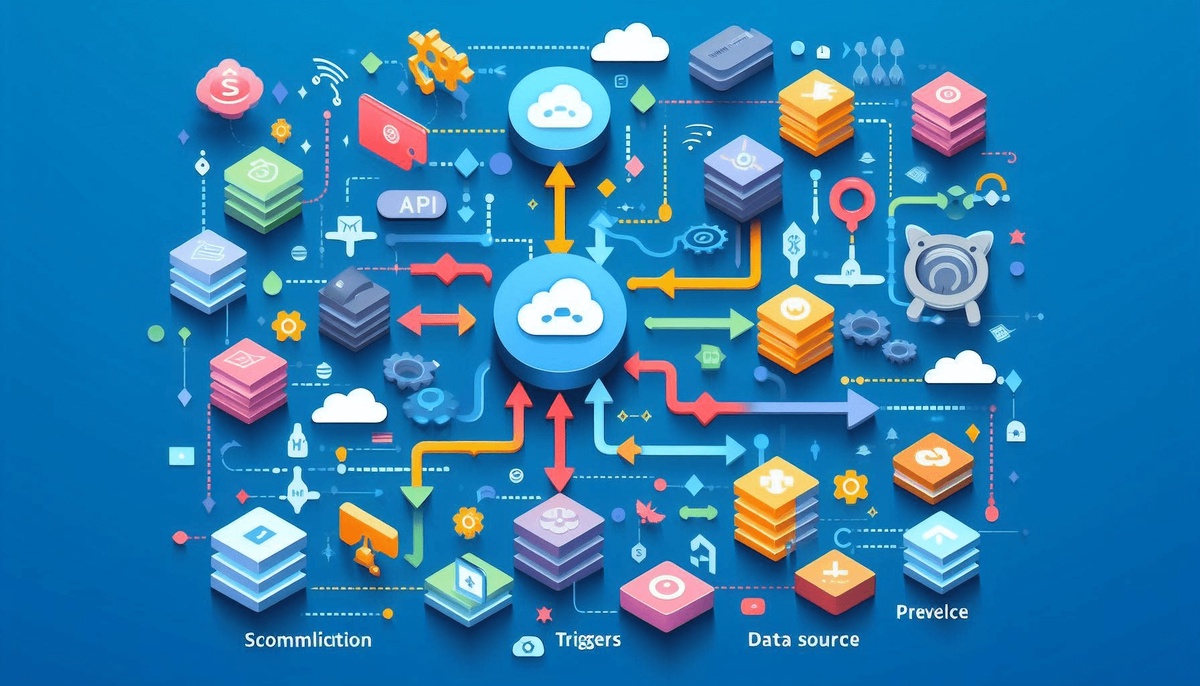Enterprises of all sizes deal with the problem of integrating numerous apps, systems, and data sources. It often leads to siloed operations and fragmented data. This can hinder productivity, decision-making, and overall efficiency. However, Azure Application Integration can help address these challenges. It helps businesses to realize the full value of their apps and data. Understanding the significance of application integration to Azure is crucial for driving operational excellence and maintaining a competitive edge. In this article, we will explore the key components of Azure Application Integration, its benefits, challenges, and best practices.
What is Azure Application Integration?
Microsoft Azure provides a suite of services that allow for easy connection and data sharing across multiple applications. It acts as a bridge, facilitating the integration of disparate systems and ensuring smooth data flow and interoperability across your company's digital ecosystem.
Key Components of Azure Application Integration
- Azure Logic Apps
- Azure Data Factory
- Azure API Management
- Azure Event Grid
- Azure Service Bus
Benefits of Azure Application Integration
Integrating your application with the Azure platform can provide numerous benefits. Let's explore them one by one.
Increase Efficiency & Productivity
Integrating diverse systems and automating workflows allows you to remove manual procedures, decrease mistakes, and streamline operations. It will improve efficiency and productivity throughout your business.
Improve Data Accessibility & Insights
Your team can access and analyze data from various sources with seamless data integration. It enables better decision-making and insights-driven strategies.
Scalability & Flexibility
Azure Application Integration services are cloud-based and highly scalable. It will allow you to easily adapt to changing business requirements and handle fluctuating workloads.
Enhance Security & Compliance
Microsoft Azure ensures robust security measures and helps you maintain regulatory compliance and protect sensitive data.
Cost Optimization
By leveraging Azure's pay-as-you-go model and serverless computing capabilities, you can optimize costs and avoid unnecessary infrastructure investments while enjoying the benefits of Application Integration to Azure.
Challenges in Azure Application Integration
When implementing Azure Application Integration, there are certain challenges that need to be taken into consideration.
Complexity of Integration Scenarios
Many companies encounter complex integration scenarios involving various applications, systems, and data sources. Navigating this complexity and designing efficient integration workflows can be challenging, particularly when dealing with legacy systems or third-party applications. Azure integration services can help simplify this situation.
Data Mapping & Transformation
Integrating data from several sources can be difficult because of variances in data formats, structures, and semantics. Precise data mapping and transformation between many systems are critical for preserving data integrity and continuity.
Security & Compliance
Integrating sensitive data and ensuring secure communication between applications and services is a critical concern. Following sector-specific laws and compliance requirements affects integration efforts.
Performance & Scalability
As the volume of data and the number of integrated systems grow, maintaining optimal performance and ensuring scalability becomes increasingly important. Load balancing, caching, and efficient resource utilization are essential considerations.
Monitoring & Troubleshooting
Monitoring and troubleshooting can be challenging with multiple components and services involved in an integration solution. Identifying and resolving issues quickly is crucial to maintaining uninterrupted operations and minimizing downtime.
Best Practices for Azure Application Integration
If you are working on implementing Azure application integration, it is advisable to follow some best practices.
Adopt a Microservices Architecture
Embrace Azure microservices to decouple applications and promote modular, scalable, and maintainable integration solutions. This architecture facilitates easier updates, testing, and deployment of individual components.
Leverage API Management
Utilize Azure API Management to effectively manage, secure, and monitor APIs across your business. Define consistent policies, enforce access controls, and gain valuable insights into API usage and performance.
Prioritize Security and Governance
Establish robust security measures to protect sensitive data and maintain regulatory compliance. Implement governance policies and procedures to ensure consistent and secure integration practices across your organization.
Plan for Disaster Recovery and Business Continuity
Develop robust Azure disaster recovery and business continuity strategies to ensure the resilience of your integration solutions. Leverage Azure's geo-redundancy and failover capabilities to minimize downtime and maintain uninterrupted operations.
Continuously Optimize
Regularly analyze and adjust your integration options in response to performance indicators, user input, and changing business needs. Embrace a continuous improvement mindset to enhance efficiency, scalability, and user experience.
Conclusion
Azure Application Integration enables seamless collaboration, data-driven insights, and operational excellence. By leveraging the power of Azure's integration, you can achieve higher productivity levels, agility, and competitive advantage. Investing in Azure Application Integration indicates a progressive approach to digital transformation. It empowers your company to break down silos, optimize processes, and make the most of your applications and data assets.


Comments (4)